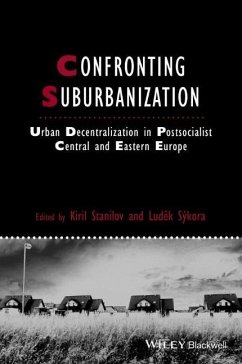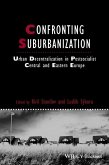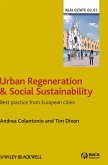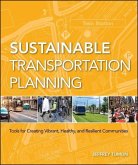This fascinating book explains the processes of suburbanizationin the context of post-socialist societies transitioning from onesystem of socio-spatial order to another. Case studies of sevenCentral and Eastern Europe city regions illuminate growth patternsand key conditions for the emergence of sprawl.
Breaks new ground, offering a systematic approach to theanalysis of the global phenomenon of suburbanization in apost-socialist context
Tracks the boom of the post-socialist suburbs in seven CEEcapital city regions - Budapest, Ljubljana, Moscow, Prague,Sofia, Tallinn, and Warsaw
Situates the experience of the CEE countries in the broadercontext of global urban change
Case studies examine the phenomenon of suburbanization alongfour main vectors of analysis related to development patterns,driving forces, consequences and impacts, and management ofsuburbanization
Highlights the critical importance of public policies andplanning on the spread of suburbanization
Hinweis: Dieser Artikel kann nur an eine deutsche Lieferadresse ausgeliefert werden.
Breaks new ground, offering a systematic approach to theanalysis of the global phenomenon of suburbanization in apost-socialist context
Tracks the boom of the post-socialist suburbs in seven CEEcapital city regions - Budapest, Ljubljana, Moscow, Prague,Sofia, Tallinn, and Warsaw
Situates the experience of the CEE countries in the broadercontext of global urban change
Case studies examine the phenomenon of suburbanization alongfour main vectors of analysis related to development patterns,driving forces, consequences and impacts, and management ofsuburbanization
Highlights the critical importance of public policies andplanning on the spread of suburbanization
Hinweis: Dieser Artikel kann nur an eine deutsche Lieferadresse ausgeliefert werden.
'This book provides a wealth of novel insights into a process that has received very little systematic attention in among researchers and policy-makers alike: the vast process of urban dispersal unfolding throughout European countries situated east of the former Iron Curtain. Moving seamlessly across a wide range of geographical contexts - from the urbanization of the countryside seen around Ljubljana to Moscow's regional suburbanization model - the authors demonstrate an acute ability to detect the local nuances and generic trends that characterize such dynamics. This edited collection can thus serve as both a foundational text for scholars as well as a guidance document for practitioners and decision-makers.'
Stefan Bouzarovski, Professor of Geography and Director of the Centre for Urban Resilience and Energy, University of Manchester
'Confronting Suburbanization sheds a bright light on the processes of contemporary metropolitan growth in a fascinating region with a long and rich urban history, and communist legacies which formed a springboard for unprecedented post-socialist dynamics. In this volume, a set of renowned international authors with close local knowledge try to untangle the complexities resulting from both external and internal forces - political reform, economic liberalization, social and demographic context - as they manifest themselves in terms of metropolitan development. The authors offer numerous insights, and clearly note that there is much both East and West can learn from this dynamic environment where intensified societal and physical transformation is happening before our eyes.'
Zorica Nedovic-Budic, Professor Chair of Spatial Planning, University College Dublin
Stefan Bouzarovski, Professor of Geography and Director of the Centre for Urban Resilience and Energy, University of Manchester
'Confronting Suburbanization sheds a bright light on the processes of contemporary metropolitan growth in a fascinating region with a long and rich urban history, and communist legacies which formed a springboard for unprecedented post-socialist dynamics. In this volume, a set of renowned international authors with close local knowledge try to untangle the complexities resulting from both external and internal forces - political reform, economic liberalization, social and demographic context - as they manifest themselves in terms of metropolitan development. The authors offer numerous insights, and clearly note that there is much both East and West can learn from this dynamic environment where intensified societal and physical transformation is happening before our eyes.'
Zorica Nedovic-Budic, Professor Chair of Spatial Planning, University College Dublin








